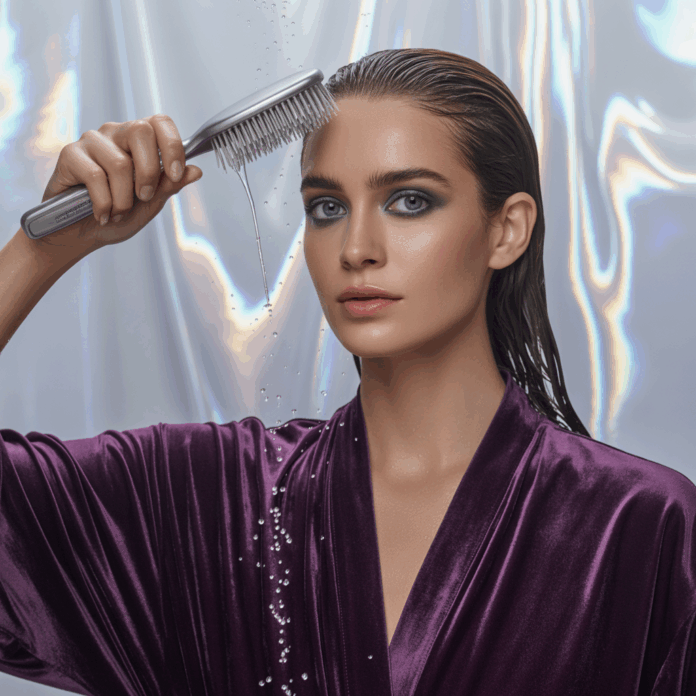Picture this: you hop out of a steamy shower, towel-wrapped hair, a quick outfit change, and 10 minutes to get out the door. The temptation to grab your brush and go is real. But is it bad to brush wet hair — will that one hurried stroke cost you frizz, breakage, or worse? As a beauty and fashion editor who lives for polished, effortless looks, I’m breaking down the science-backed answer and sharing chic styling tips so your wet-hair routine supports healthy strands and a camera-ready finish.
Is it bad to brush wet hair? The short, honest answer
In short: brushing soaking wet hair can be risky. Wet hair is more elastic and fragile, so aggressive brushing or using the wrong tool can cause snap-off breakage and split ends. That said, it’s not an automatic hair crime — there are smart ways to detangle and style wet hair that minimize damage. The trick is technique, timing, and the right products.
Why wet hair is more vulnerable
- Hair shafts swell with water, weakening the cuticle and making strands stretch more easily.
- Tugging from roots to ends when the hair is saturated increases the chance of breakage.
- Rough towel-drying and brushing immediately after a hot shower both contribute to frizz and split ends.
How to detangle wet hair without damaging it
Follow these pro steps to keep your strands intact:
- Gently squeeze excess water with a microfiber towel or cotton T-shirt instead of rubbing.
- Apply a leave-in conditioner, detangling spray, or lightweight oil to wet lengths to add slip.
- Start at the ends and work your way up in sections — never yank from the roots.
- Use a wide-tooth comb, a detangling brush specifically made for wet hair, or your fingers to untangle knots.
- If you must brush, do it slowly and only after the hair is damp rather than dripping wet.
Best tools for wet hair
- Wide-tooth comb for initial detangling
- Detangling brush with flexible bristles for finishing
- Microfiber towel or old cotton tee to reduce friction
- Heat protectant spray if you’ll blow-dry or style with tools
When brushing wet hair is acceptable — and when to avoid it
There are moments when brushing wet hair can be fine, and others when you should abstain:
- Okay: Brushing gently after applying leave-in conditioner and once hair is damp (not dripping).
- Avoid: Brushing vigorously directly after showering when hair is fully saturated and fragile.
- Pro tip: For textured or curly hair, finger detangling and wide-tooth combs help preserve pattern and reduce frizz.
Beauty routine integration: hair care, skincare, and makeup for busy days
Your haircare choices influence your overall aesthetic. Pair a gentle wet-hair routine with these beauty tips for cohesive, polished style.
Quick skincare routine for fresh-faced mornings
- Cleanse with a gentle gel or cream cleanser.
- Pat dry and apply a vitamin C serum for brightness.
- Moisturize and add SPF — even on cloudy days.
- For evenings, swap to a retinol or hydrating night cream.
Makeup suggestions that complement air-dried or blow-dried hair
- Air-dried, beachy waves: Keep makeup fresh with dewy skin, cream bronzer, and a glossy lip.
- Sleek, blow-dried look: Aim for a bold brow, matte foundation, and a statement liner for contrast.
- Short on time: Tinted moisturizer, mascara, and a tinted balm give you a put-together vibe in minutes.
For more product ideas and current looks, check out our makeup trends guide.
Outfit combinations and style tips that pair with your hair choices
Your hairstyle sets the tone of your outfit. Here are outfit ideas to match your wet-hair routine:
- Casual air-dry undone waves: Throw on high-waist jeans, a silk camisole, and white sneakers for a city-chic vibe.
- Sleek low bun: Pair with a tailored blazer, trousers, and pointed flats for an office-ready ensemble.
- Effortless towel-dry topknot: Combine with an oversized knit, leggings, and ankle boots for a coffee-run look.
Need styling inspo? Our fashion guides have seasonal combinations to keep your wardrobe fresh.
Haircare tips to prevent damage and build long-term strength
- Trim regularly to avoid split ends — every 8–12 weeks depending on growth and condition.
- Limit heat styling and use a good heat protectant when you do.
- Incorporate weekly deep-conditioning treatments or hair masks to restore moisture.
- Sleep on a silk or satin pillowcase to reduce friction and morning tangles.
- Eat a balanced diet rich in protein, vitamins, and omega-3s to support hair health from within.
Frequently Asked Questions
Brushing wet hair aggressively can contribute to split ends because the cuticle is lifted and more fragile. Gentle detangling, starting from the ends and using a wide-tooth comb, reduces the risk.
For curly or textured hair, detangle in the shower with conditioner, using fingers or a wide-tooth comb. Apply a leave-in conditioner and avoid brushing dry curls to prevent frizz and shape loss.
Yes—if you can, let hair air-dry until damp rather than wet before brushing. This reduces stretch and breakage. If you need to style immediately, use appropriate products and a gentle detangling tool.
Final verdict: Is it bad to brush wet hair?
So, is it bad to brush wet hair? It can be — but it doesn’t have to be. Brushing soaking wet hair with the wrong tool or technique increases breakage and frizz. The healthier approach is to detangle gently: blot excess water, add a slip-enhancing product, start at the ends, and use a wide-tooth comb or a brush made for wet hair. Combine these habits with a supportive beauty routine, from skincare to outfit choices, and your hair will look as polished as your style.
Ready to protect your strands and elevate your look? Try these steps tonight: swap your terry towel for a microfiber wrap, add a leave-in conditioner, and practice detangling from the ends up. Share your routine or ask a question below — I love hearing what works for you!
For more quick beauty fixes and in-depth routines, explore our skincare tips and keep experimenting with the looks you love.



